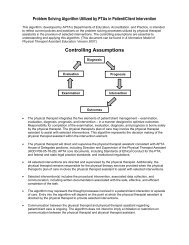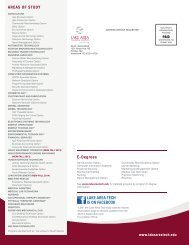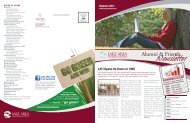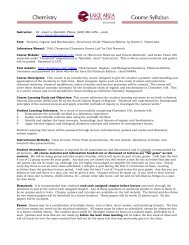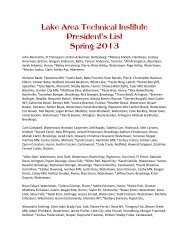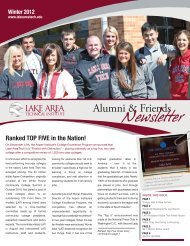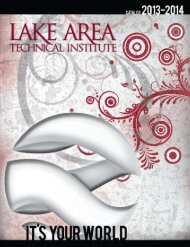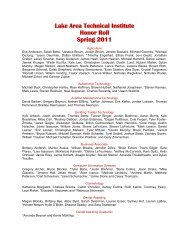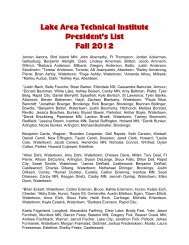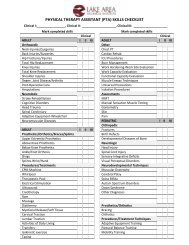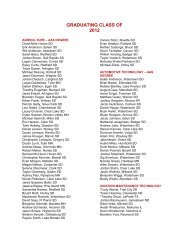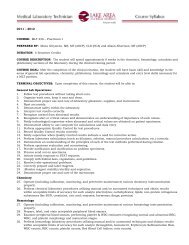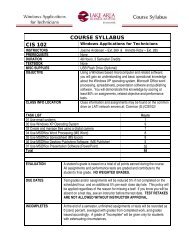Areas Of Study - Lake Area Technical Institute
Areas Of Study - Lake Area Technical Institute
Areas Of Study - Lake Area Technical Institute
You also want an ePaper? Increase the reach of your titles
YUMPU automatically turns print PDFs into web optimized ePapers that Google loves.
ENV 240 CAPSTONE PROJECT<br />
A self-study project demonstrating the educational and<br />
personal development received at <strong>Lake</strong> <strong>Area</strong> Tech. Credit<br />
assigned by instructor. 1 credit<br />
EO 100 INTRODUCTION TO PROCESS TECHNOLOGY<br />
This course provides an introduction to process plant<br />
operations including ethanol plants, chemical and refinery<br />
plants, natural gas facilities, gasification operations,<br />
combined cycle and food processing operations. 3 credits<br />
EO 103 FOUNDATIONS OF ENERGY OPERATIONS<br />
A basic introduction to the field of energy operations.<br />
3 credits<br />
EO 110 FUNDAMENTALS OF THERMODYNAMICS<br />
THEORY AND LAB<br />
This course will study heat transfer, fluid flow and the<br />
conservation of energy. Specific equipment design and<br />
thermodynamic principles will be covered. 3 1/2 credits<br />
EO 115 INTRODUCTION TO THE ELECTRIC INDUSTRY<br />
Provides an overview of the electrical power industry,<br />
including its history, development and regulatory<br />
environment. Students learn about the transmission of<br />
electricity and the development of regional and national<br />
energy grids, including changes in the regulation of the<br />
power industry. 3 credits<br />
EO 200 BOILER OPERATIONS<br />
Provides a comprehensive study of industrial manufacturing<br />
plant boilers and furnaces, and supporting auxiliary systems.<br />
Students will study typical process plant boiler, oxidizer<br />
and furnace types, their operation, safe firing theory,<br />
troubleshooting techniques, and typical maintenance.<br />
2 credits<br />
EO 201 POWER PLANT EQUIPMENT<br />
Covers the various types of equipment used in the production<br />
of electricity, including pumps, valves, air compressors,<br />
coal pulverizors, fans, cooling towers, condensers and heat<br />
exchangers. 3 credits<br />
EO 204 DISTILLATION AND REFINERY OPERATIONS<br />
A comprehensive study of processes associated with refining<br />
and petrochemical distillation. This course will also focus on<br />
equipment designs, operation requirements and technician<br />
responsibilities associated with the operation of typical<br />
distillation facilities. 4 credits<br />
EO 205 GAS TURBINES AND COMBINED CYCLE<br />
OPERATIONS<br />
Students will study all the elements that make up a gas<br />
turbine and a combined cycle unit. This course also covers<br />
the safe and efficient operation of gas turbines and heat<br />
recovery steam generators and different applications for<br />
combine cycle and cogeneration configerations. 4 credits<br />
EO 206 GAS PROCESSING<br />
A comprehensive study of the processing technologies<br />
associated with the prodcution of natural gas and other<br />
gases found within natural gas fields. Students will study<br />
gas laws, molecular sturcture, process theory, terminology,<br />
equipment and the auxilery systems which support the<br />
production and processing of gases. 3 credits<br />
EO 208 ETHANOL BIOFUELS PRODUCTION<br />
Covers the design, operation, equipment and process flows<br />
of ethanol plants and biofuels facilities including biodiesel<br />
plants. Students will have the ability to interpret basic flow<br />
diagrams, understand related terminology, focus on safety<br />
considerations, typical maintenance, and startup/shutdown<br />
procedures. 4 credits<br />
EO 210<br />
EO 211<br />
EO 214<br />
EO 215<br />
EO 216<br />
EST 103<br />
EST 106<br />
EST 109<br />
EST 112<br />
EST 115<br />
EST 118<br />
EST 121<br />
EST 124<br />
EST 175<br />
EST 214<br />
EST 216<br />
REFRIGERATION<br />
Provides a comprehensive study of refrigeration. 1 credit<br />
POWER GENERATION, TRANSMISSION AND<br />
DISTRIBUTION<br />
Students will study the design and construction of large<br />
industiral generators used in electricity production. Also<br />
covered are the various exciter designs and operation and<br />
the various auxilery equipment that supports generator<br />
operation. 2 credits<br />
INSTRUMENTATION AND CONTROLS<br />
SIMULATIONS<br />
Students will use specifically designed computerized<br />
software simulations to run control systems involved with<br />
the operation of energy facilities. 3 credits<br />
PLANT OPERATIONS AND TROUBLESHOOTING<br />
Students will gain the knowlege necessary to comprehend<br />
overall power plant operations and respond to abnormal<br />
operating conditions. Students will also participate in root<br />
cause analysis exercises while troubleshooting different<br />
operating scenarios. 2 credits<br />
INTERNSHIP/CAPSTONE PROJECT<br />
Students will participate in an on-site internship placement<br />
in an energy production facility. 6 credits<br />
PRINCIPLES OF DC CIRCUITS THEORY<br />
Covers the basic principles and applications of electricity<br />
and electronics. 2 credits<br />
PRINCIPLES OF DC CIRCUITS LAB<br />
Provides hands-on experience in building, testing and trouble<br />
shoot ing DC/AC circuits. Includes basic soldering skills.<br />
2 cred its<br />
PRINCIPLES OF AC CIRCUITS THEORY<br />
Covers the basic principles of AC circuits and applications.<br />
2 credits<br />
PRINCIPLES OF AC CIRCUITS LAB<br />
Provides students with hands-on experience in building,<br />
testing and troubleshooting AC circuits. 2 credits<br />
ELECTRONICS DEVICES I THEORY<br />
Introduces theory and applications for diodes and<br />
transistors. This will include power supplies and transistor<br />
amplifier circuits. 3 credits<br />
ELECTRONICS DEVICES I LAB<br />
Provides hands-on applications for diodes and transistors<br />
circuits which includes power supplies and transistor<br />
amplifier circuits. 3 credits<br />
DIGITAL I THEORY<br />
Introduces the principles of basic gates, numbering systems,<br />
de cod ers, encoder and flip-flops. 3 credits<br />
DIGITAL I LAB<br />
Provides hands-on applications of basic gates, Boolean<br />
algebra, decoders, encoders and flip-flops. 3 credits<br />
BASIC MOTOR CONTROLS<br />
This class reviews the basic concepts of motor controls<br />
including types of motors (manual, remote, or automatic),<br />
how to read motor control diagrams, and required hardware<br />
for specific applications. 3 credits<br />
DIGITAL II THEORY<br />
Introduces the principles of counters, shift registers,<br />
memories and arithmetic circuits. 3 credits<br />
DIGITAL II LAB<br />
Provides students with hands-on applications of counters,<br />
shift registers, memories and arithmetic circuits. 3 credits<br />
85



